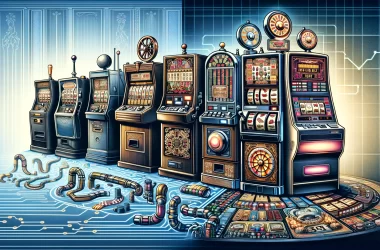There’s no doubt about the fact that slot machines are some of the most popular games in any casino. They’re not known for being predictable, though, and that can sometimes obscure our ability to make sound gaming decisions.
One pervasive myth is that Atlantic City casinos adjust payout rates depending on the hour of the day How are Slot Machines Programmed? , but this simply isn’t true; random number generators determine each spin’s result.
They’re rigged
It’s important to know how they operate before you assume that slot games are rigged or somehow unfairly weighted against you. Every spin is random and cannot be predicted or influenced by past results – it doesn’t matter if you’ve had 5 losses in a row. Also, counting spins won’t help you divine future outcomes.
Some people think high-rollers get better luck with these games, too, but this is just ignorant – as though slot machines were programmed to discriminate against average Joes like us. The truth is computers generate random numbers to decide whether or not you win.
It’s a game of chance
No matter how much money you bet, there’s no way to work up a reliable strategy for winning these games. You’d just be setting yourself up for disappointment (and possibly addiction).
Another falsehood tells us that hitting it big on slots takes luck above all else. This isn’t true either; probability theory explains why this particular myth is wrong — pushing a button rather than pulling a lever has nothing to do with spinning an unprejudiced outcome.
It’s a game of skill
Modern slot machines feature computerized programs called Random Number Generators (RNGs), so every spin comes out differently from the rest — no one can predict when it will pay out or not pay out at all . Some may deliver massive wins while others go cold after long streaks of paying off.
Counting spins or searching for patterns in the game will not lead you to predict future outcomes. Slot machines should be appreciated for their entertainment rather than being viewed as tools of success.
It’s a game of luck
It’s no secret that slot machines are some of the most loved games on casino floors, but it is a fact that they’re also some of the most misunderstood. Many people think there is a machine timing myth going around where certain ones will pay out soon if they haven’t already or playing at specific times will increase chances; neither of these beliefs hold water and may even result in disappointment and frustration.
Every spin is independent and without any form of influence from previous events so no matter how frequently it has happened in the past or what patterns emerge as you observe each spin of any given machine, nobody can guess with certainty what the next outcome will be.
It’s a game of chance
Everything about slot machines screams randomness, and yet we still believe that certain days and times give us better odds of winning — or that certain machines are “due” for one lucky payout.
One of the most common myths surrounding slot machines is the Gambler’s Fallacy. It’s important for gamblers to recognize that each spin of a slot machine is completely random and not influenced by past spins, so there are no “lucky” or “unlucky” streaks.
There’s a strategy
Some people try to find patterns in their losses or wins and believe that counting the number of spins will help them predict future outcomes. But this isn’t true; each spin is independent of one another! This is pure nonsense.
Another common misconception is that casinos rig their machines to give out more winnings during slow hours. In reality, all slot machines use Random Number Generators (RNGs), making every spin completely unpredictable.
They are based on chance
The truth about slots gaming is that it’s purely based on luck and should be played for entertainment purposes only. Don’t fall into the trap of thinking there’s some secret to winning big — many have tried and failed!
Myth: Casinos loosen slots during the weekdays when fewer people play in order to make more money off patrons who believe they are getting better odds. The fact remains, though, that each individual spin on any given machine has nothing at all to do with what happened before or will happen afterward!
There’s no skill involved
Playing slots requires absolutely no skill or strategy — it’s a game of chance through and through. When people start thinking they can identify patterns or count spins for better odds, they’ve fallen victim to gambling fallacy, which can lead down a dangerous road towards addiction.
Fortunately, slot machines operate using Random Number Generators (RNGs), so you don’t even need to worry about your timing being perfect when pressing a button or pulling a lever; it won’t change your chances!












